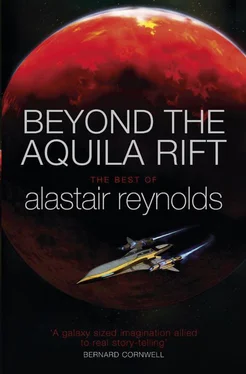“You’re saying they’re not real?”
“Oh, I wouldn’t go that far. But entirely free of tampering, manipulation?” I don’t actually make the accusation: I just leave it there in unactualised form, where it will do just as much harm.
“OK,” The Baby says. “I’ve just soiled myself. Let’s break for a nappy change, and then we’ll come back to talk about your adventures.”
* * *
THE DAY AFTER we take the slev down to Washington, where I’m appearing in a meet and greet at the Smithsonian National Air and Space Museum. They’ve bussed in hundreds of schoolchildren for the event, and frankly I’m flattered by their attention. On balance, I find the children much more to my taste than The Baby. They’ve no interest in stirring up professional rivalries, or trying to make me feel as if I ought to think less of myself for being a machine. Yes, left to myself I’d be perfectly happy just to talk to children. But (as my sponsors surely know) children don’t have deep pockets. They won’t be buying the premium editions of my book, or paying for the best seats at my evening speaking engagements. They don’t run chat shows. So they only get an hour or two before I’m on to my more lucrative appointments.
“Do you walk around inside it?” asks one boy, speaking from near the front of my cross-legged audience.
“Inside the vehicle?” I reply, sensing his meaning. “No, I don’t. You see, there’s nothing inside the vehicle but machinery and fuel tanks. I am the vehicle. It’s all I am and when I’m out in space, it’s all I need to be. I don’t need these arms and legs because I use nuclear-electric thrust to move around. I don’t need these eyes because I have much better multispectrum sensors, as well as radar and laser ranging systems. If I need to dig into the surface of a moon or asteroid, I can send out a small analysis rover, or gather a sample of material for more detailed inspection.” I tap my chest. “Don’t get me wrong: I like this body, but it’s just another sort of vehicle, and the one that makes the most sense during my time on Earth.”
It confuses them, that I look the way I do. They’ve seen images of my spacefaring form and they can’t quite square it with the handsome, well-proportioned androform physiology I present to them today. My sponsors have even given me a handsome, square-jawed face that can do a range of convincing expressions. I speak with the synthetic voice of the dead actor Cary Grant.
A girl, perhaps a bit smarter than the run of the mill, asks: “So where is your brain, Vincent?”
“My brain?” I smile at the question. “I’m afraid I’m not lucky enough to have one of those.”
“What I mean,” she returns sharply, “is the thing that makes you think. Is it in you now, or is it up in the vehicle? The vehicle’s still in orbit, isn’t it?”
“What a clever young lady you are. And you’re quite right. The vehicle is still in orbit—waiting for my next expedition to commence! But my controlling intelligence, you’ll be pleased to hear, is fully embedded in this body. There’s this thing called timelag, you see, which would make it very slow for me…”
She cuts me off. “I know about timelag.”
“So you do. Well, when I’m done here—done with my tour of Earth—I’ll surrender this body and return my controlling intelligence to the vehicle. What do you think they should do with the body?” I look around at the ranged exhibits of the Smithsonian National Air and Space Museum—the fire-scorched space capsules and the spindly replicas of early space probes, like iron crabs and spiders. “It would look rather fine here, wouldn’t it?”
“Were you sad when you found the people on Titan?” asks another girl, studiously ignoring my question.
“Distraught.” I look down at the ground, set my features in what I trust is an expression of profound gravitas. “Nothing can take away from their bravery, that they were willing to risk so much to come so far. The furthest any human beings have ever travelled! It was awful, to find them like that.” I glance at the nearest teacher. “This is a difficult subject for children. May I speak candidly?”
“They’re aware of what happened,” the teacher says.
I nod. “Then you know that those brave men and women died on Titan. Their descent vehicle had suffered a hull rupture as it tried to enter Titan’s atmosphere, and by the time they landed they only had a limited amount of power and air left to them. They had no direct comms back to Earth by then. There was just enough time for them to compose messages of farewell, for their friends and loved ones back home. When I reached the wreck of their vehicle—this was three days after their air ran out—I sent my sample-return probe inside the craft. I wasn’t able to bring the bodies back home with me, but I managed to document what I found, record the messages, offer those poor people some small measure of human dignity.” I steeple my hands and look solemn. “It’s the least I could do for them.”
“Sometimes the children wonder if any other people will ever go out that far again,” the teacher asks.
“It’s an excellent question. It’s not for the likes of me to decide, but I will say this.” I allow myself a profound reflective pause. “Could it simply be that space is too dangerous for human beings? There would be no shame in turning away from that hazard—not when your own intellects have shaped envoys such as me, fully capable of carrying on your good works.”
Afterwards, when the children have been bussed back to their schools, I snatch a moment to myself among the space exhibits. In truth I’m rather moved by the experience. It’s odd to feel myself part of a lineage—in many respects I am totally unique, a creature without precedence—but there’s no escaping the sense that these brave Explorers and Pioneers and Surveyors are my distant, dim forebears. I imagine that a human must feel something of the same ancestral chill, wandering the hallways of the Museum of Natural History. These are my precursors, my humble fossil ancestors!
They would be suitably awed by me.
* * *
ACROSS THE ATLANTIC by ballistic. Routine promotional stops in Madrid, Oslo, Vienna, Budapest, Istanbul, Helsinki, London. There isn’t nearly as much downtime as I might wish, but at least I’m not faced with that tiresome human burden of sleep. In the odd hours between engagements, I drink in the sights and sounds of these wonderful cities, their gorgeous museums and galleries. More Van Gogh! What a master this man was. Space calls for me again—there are always more worlds to map—but I imagine I could be quite content as a cartographer of the human cultural space.
No: that is an absurdity. I could never be satisfied with anything less than the entire solar system, in all its cold and dizzying magnificence. It is good to know one’s place!
After London there is only one more stop on my European itinerary. We take the slev to rainy Berlin, and then a limo conveys me to a complex of studios on the edge of the city. Eventually we arrive at a large, hangar-like building which once housed sound stages. It has gone down a bit since those heady days of the silver screen, but I am not one to complain. My slot for this evening is a live interview on Derek’s Cage, which is not only the most successful of the current chat show formats, but one which addresses a sector of the audience with a large disposable income.
The format, even by the standards of the shows I have been on so far, is slightly out of the ordinary. My host for the evening is Derek, a fully-grown Tyrannosaurus Rex. Derek, like The Baby (they are fierce rivals) is the product of radical genetic manipulation. Unlike The Baby, Derek has very little human DNA in his make-up. Derek is about fifty years old and has already had a number of distinct careers, including musician and celebrity gourmand.
Читать дальше











